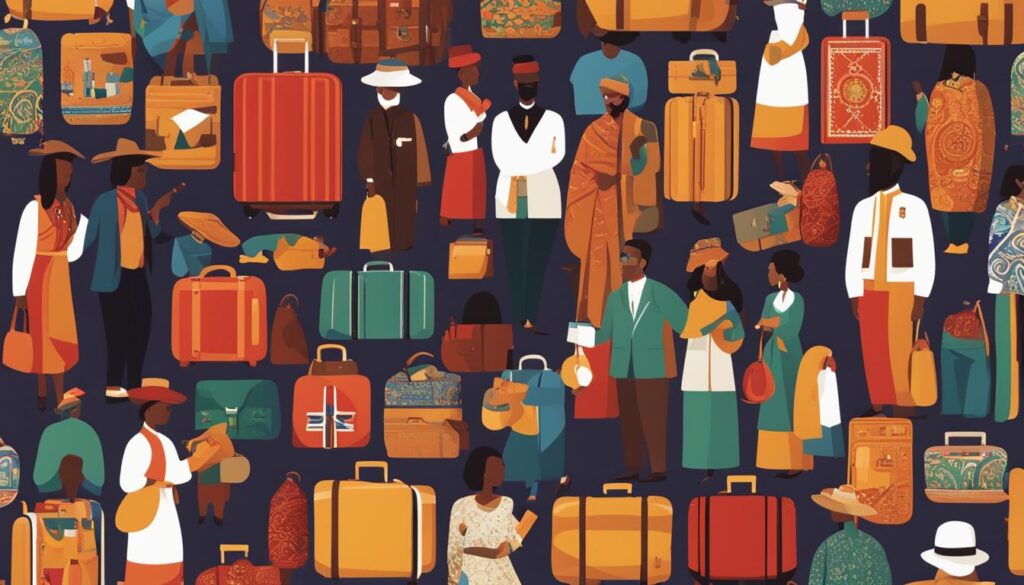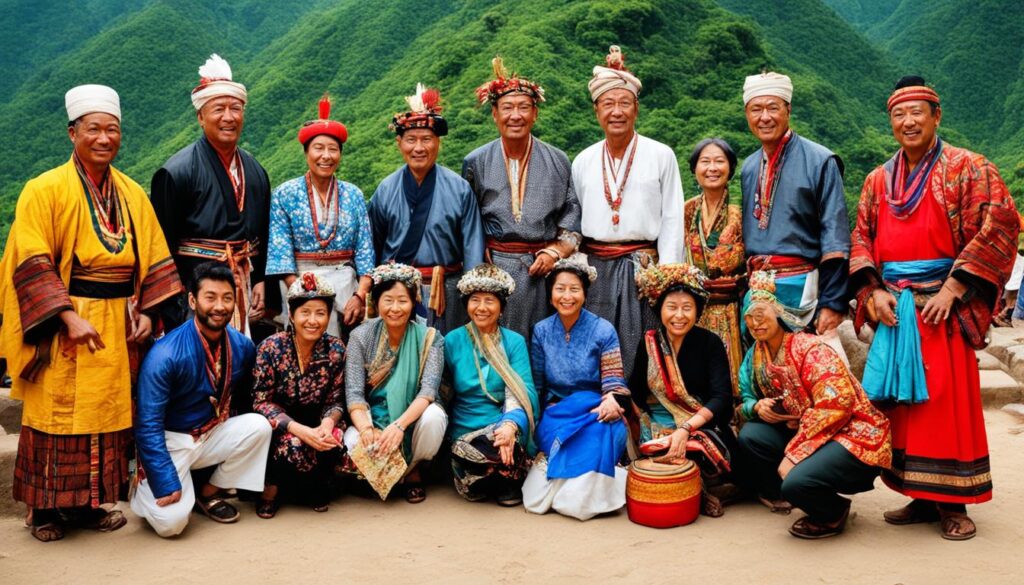If you’re planning to travel abroad, cultural awareness is key to a positive and enriching experience. Being aware of global etiquette can help you navigate diverse cultures and avoid misunderstandings. Understanding local customs, values and attitudes can help you connect with people from different backgrounds and gain a deeper appreciation of their way of life. This section will provide you with essential insights into cultural awareness for travelers and offer practical tips to help you enhance your global cultural competency before embarking on your trip.
The Benefits of Cultural Awareness for Travelers
Travel is not just about visiting different places, it is also about experiencing diverse cultures. Cultural awareness is critical when travelling to new places because it exposes you to the customs, traditions, and beliefs of different communities.
By embracing diversity while traveling, you can have a more enriching experience that goes beyond just ticking off tourist attractions on your itinerary. You can build meaningful connections with locals, learn from their perspectives and broaden your worldview.
Travel cultural awareness encourages empathy and respect which can create a positive impact on your interactions with locals. You become more adaptable and able to appreciate different lifestyles, which can translate into gains back home in the long run. By understanding diverse perspectives, you become more open-minded and become more likely to approach challenges with a broader worldview.
“Travel makes one modest. You see what a tiny place you occupy in the world.”
– Gustave Flaubert
Take the time to embrace cultural diversity during your travels- it truly personalizes your journey and allows you to connect with locals on a meaningful level. As you learn to adapt to local customs and traditions, you will come to understand that cultural differences are an opportunity for growth, unity and comradery.
Cultural Sensitivity in Travel: Why It Matters
When traveling to new destinations, it’s important to be mindful of cultural sensitivity. Understanding and respecting the traditions and customs of the places you visit can promote positive interactions with locals and enhance your travel experience. Being culturally competent as a tourist means recognizing and valuing cultural diversity.
By adopting a culturally sensitive approach, you’ll be able to avoid unintentionally offending others and navigate cultural differences with ease. This can help you build stronger relationships with locals and open up opportunities for authentic cultural experiences.
To demonstrate cultural sensitivity, it’s important to familiarize yourself with the cultural etiquette of the destinations you plan to visit. This includes learning about dress codes, appropriate forms of address, and customs relating to food, gift-giving, and social interaction.
Why Cultural Sensitivity is Important for Tourists
Cultural sensitivity isn’t just about doing the right thing – it’s also a way to deepen your understanding of the world and the people who inhabit it. By immersing yourself in diverse cultures and embracing different ways of life, you’ll gain a more nuanced perspective of the world, and become more accepting of different people and beliefs.
“Cultural differences should not separate us from each other, but rather cultural diversity brings a collective strength that can benefit all humanity.” – Robert Alan
The Benefits of Cultural Competency for Tourists
Being culturally competent as a tourist has many benefits, including:
- Improved communication and understanding with locals
- Enhanced travel experiences through authentic cultural immersion
- Increased respect for diversity and different cultural beliefs
- Less likelihood of offending locals or violating cultural norms
Ultimately, by prioritizing cultural sensitivity in your travels, you’ll be able to build meaningful connections with people from different cultures and have a more enriching and rewarding travel experience.
Enhancing Global Cultural Awareness Before Your Trip
Before embarking on a trip, it is essential to enhance your global cultural awareness to better connect with the local culture. Being aware of the customs and traditions of the places you will visit can help you avoid misunderstandings and foster positive relationships with locals.
Here are some practical tips to help you prepare:
- Do your research: Learn about the customs, etiquette, and culture of the places you will visit through guidebooks, online resources, or by talking to locals. This will help you understand what is considered acceptable behavior and avoid cultural faux pas.
- Learn the language: A basic knowledge of the local language can go a long way in showing respect for the culture and building relationships with locals. Even if you can’t speak fluently, learning a few key phrases can make a huge difference.
- Be open-minded: Embrace diversity and keep an open mind when encountering new cultures. Avoid making assumptions or judgments based on your own cultural norms.
- Try the local cuisine: Food is an essential part of any culture, and trying local dishes is a great way to experience the flavors and traditions of a place. Be adventurous and willing to try new things!
Remember that building cross-cultural understanding takes time and effort. Keep an open mind and approach your travels with curiosity and a desire to learn about other cultures.
Interacting with Locals: The Key to Cultural Appreciation
One of the most rewarding aspects of travel is the opportunity to connect with locals and immerse oneself in different cultures. By interacting with locals, you can gain an authentic understanding of the traditions, customs, and ways of life of the places you visit.
Effective intercultural communication is key to fostering meaningful connections with locals and appreciating their culture. This involves actively listening to their perspectives, being open-minded, and showing respect for their beliefs and practices.
One way to enhance your intercultural communication skills is to learn some of the local language before your trip. Even basic phrases such as “hello,” “thank you,” and “how are you?” can go a long way in breaking down linguistic barriers and demonstrating your interest in the local culture.
Another way to interact with locals is to participate in community events and cultural activities. These experiences can provide a unique insight into local traditions and also offer opportunities to connect with local people in a meaningful way.
Remember, building relationships with locals takes time and effort. Be patient, ask questions, and approach interactions with an open mind. Your efforts to connect with locals will not only enhance your travel experience, but also promote positive cultural exchange.
Cultural Etiquette: Dos and Don’ts for Tourists
Respecting cultural etiquette is crucial to ensuring a positive travel experience for both you and the local community. Here are some dos and don’ts to keep in mind:
Do Your Research
Before embarking on your trip, take some time to familiarize yourself with the cultural customs and traditions of the places you’ll be visiting. This will equip you with the knowledge necessary to interact with locals in a respectful and appropriate manner.
Respect Religious Sites and Customs
Many cultures have deeply ingrained religious beliefs and customs. It’s important to show proper respect when visiting religious sites, such as covering your head or removing your shoes if required. Be mindful of local customs when it comes to dress, behavior, and communication.
Avoid Stereotyping
Avoid making assumptions about a culture or people based on stereotypes. Every culture has its unique traditions, beliefs, and norms. Embrace the opportunity to learn and appreciate new ways of thinking and living.
Be Polite and Courteous
Simple gestures like saying “please” and “thank you” in the local language can go a long way in showing respect for the local culture. When in doubt, err on the side of politeness and courtesy.
Don’t Be Invasive
Be mindful of personal space and boundaries. Avoid taking photos or videos without permission, and respect the privacy of locals. Remember that you are a guest in their country and should act accordingly.
By following these cultural etiquette dos and don’ts, you can promote positive cultural exchange and foster respectful intercultural communication throughout your travels.
Overcoming Cultural Misunderstandings: Common Pitfalls to Avoid
As you travel and immerse yourself in new cultures, it’s essential to be aware of potential cultural misunderstandings that can arise. These misunderstandings can lead to confusion, offense, and embarrassment, and can even damage relationships with locals. To help you navigate cross-cultural interactions with greater ease, here are some common cultural pitfalls to avoid:
| Cultural Misunderstanding | Strategy for Overcoming It |
|---|---|
| Assuming that all people in a given culture think or act the same way | Recognize that cultural diversity exists within every culture, and try to learn about specific customs and values in the places you visit |
| Using nonverbal communication that may be considered offensive in different cultures | Be aware of nonverbal cues that may be interpreted differently across cultures, such as gestures, eye contact, and personal space |
| Speaking too loudly or too softly | Adjust your volume to match that of the people around you, and practice active listening to ensure clear communication |
| Assuming that everyone speaks English | Learn some basic phrases in the local language and be prepared with a translation app or dictionary, if necessary |
Remember, the goal of cultural awareness is not to perfect your behavior or avoid all mistakes, but to approach cross-cultural interactions with humility, curiosity, and a willingness to learn.
Adapting to Local Customs: Navigating Cultural Differences
Traveling presents an opportunity to immerse yourself in different cultures, but it also requires sensitivity and respect for local customs. Adapting to local customs means embracing diversity while traveling and demonstrating cultural sensitivity.
Learning about local customs before you travel can help you navigate cultural differences. Researching a destination’s dress codes, taboos, and social expectations can help you avoid inadvertently offending locals. For example, in Japan, taking off your shoes before entering someone’s home is a sign of respect, while in Morocco, showing the soles of your feet is considered disrespectful.
Examples of Adapting to Local Customs:
| Location | Custom | Adaptation |
|---|---|---|
| India | Eating with your hands | Follow local customs and give it a try! Wash your hands before and after the meal. |
| South Korea | Bowing as a gesture of respect | Practice bowing before your trip and follow the lead of locals in the duration of your visit. |
| Egypt | Dressing modestly | Wear lightweight fabrics covering most of your body. |
When it comes to adapting to local customs, remember that every culture is unique, and what works in one country might not work in another. Embracing different customs can make your travel experience more enjoyable and may help you create lasting connections with locals. But always be mindful of cultural sensitivity in travel and respect the traditions and customs of the places you visit.
Respecting Sacred Sites and Beliefs: Ethical Tourism
As a responsible and culturally aware traveler, it is crucial to respect the sacred sites and beliefs of the places you visit. Doing so not only preserves the cultural heritage of the destination but also shows your respect for the local community.
One way to promote ethical tourism is by researching the cultural customs and traditions of your destination beforehand. This way, you can ensure that you dress appropriately and behave respectfully when visiting sacred sites, such as temples, mosques, or churches.
Moreover, be mindful of your behavior when interacting with locals. Avoid making insensitive comments or gestures and seek to learn about the local culture instead. It is essential to remember that what may be acceptable in one culture may be perceived as disrespectful or offensive in another.
By embracing cultural etiquette and respecting sacred sites and beliefs, you can engage in ethical tourism practices that prioritize cultural sensitivity and appreciation.
Continuing Cultural Learning: Post-Travel Reflection
Cultural learning doesn’t stop when your trip ends. In fact, it’s important to continue building your cultural awareness and embracing diversity while traveling even after you return home.
One way to continue learning is to reflect on your experiences. Think about how your trip opened your eyes to different cultures and ways of life. Consider what surprised you, what you learned, and how you can apply your newfound cultural understanding to your daily life.
Reading up on the history, traditions, and customs of the places you visited is another great way to expand your knowledge and understanding. You can also take language classes, attend cultural events in your community, or connect with people from different backgrounds to continue your cultural education.
Remember, cultural learning is a lifelong journey. By continuing to embrace diversity and build your global cultural awareness, you’ll not only become a better traveler, but also a more open-minded and empathetic global citizen.
Conclusion
Understanding global etiquette and cultural awareness is crucial for travelers in enhancing their travel experience. By embracing diversity and respecting cultural differences, you can broaden your horizons, make meaningful connections with locals, and gain a deeper understanding of different cultures.
Remember to be culturally sensitive and respectful, adapting to local customs and avoiding common pitfalls such as cultural misunderstandings. By practicing ethical tourism and respecting sacred sites and beliefs, you can ensure that you leave a positive impact on the places you visit.
Cultural learning doesn’t have to stop when your trip is over. Take the opportunity to reflect on your experiences and apply your newfound cultural awareness in your everyday life, promoting positive intercultural communication in your community.
Overall, by prioritizing cultural awareness, you can have a more enriching and fulfilling travel experience, while also promoting responsible and respectful tourism practices.

















































